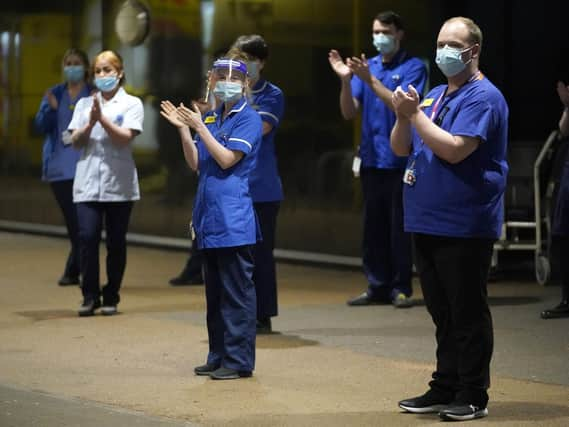Five steps to help our NHS as coronavirus cases rise in Yorkshire - NHS Confederation chief executive Matthew Taylor


To put that in context, on July 19, so-called ‘Freedom Day’, there were 39,950 new cases across the country, and in Yorkshire and the Humber alone, there were more than 4,000.
Alongside this and the soaring demand for non-Covid care, numerous NHS trusts have had to declare “black alerts”.
Advertisement
Hide AdAdvertisement
Hide AdThis included Barnsley Hospital in June, with reports that hundreds of patients were flooding its A&E department.
This level of alert means organisations are “unable to deliver comprehensive care”, something that is almost unprecedented at this time of year.
NHS teams are working flat out to make sure as many people as possible can receive care and thanks to their efforts, the number of people waiting longer than a year for non-urgent treatment has fallen significantly in recent months.
But the health service clearly faces a huge challenge, with 5.3 million patients waiting to start treatment across the country.
Advertisement
Hide AdAdvertisement
Hide AdCompounding that is the fact that there are also still more than 76,000 vacancies across the health service, including more than 8,000 in the North East and Yorkshire.
The NHS is under extreme and increasing pressure, to the point that now – in summer – feels like the toughest part of winter.
This is true not just in hospitals, but across primary care, mental health services, ambulances and community services.
Sajid Javid, the Health and Social Care Secretary, has warned that cases of Covid-19 and hospital admissions will go up even further in the coming weeks, with some estimates suggesting up to 200,000 new cases a day.
Advertisement
Hide AdAdvertisement
Hide AdFrom the Government, that means there must be clarity on funding for NHS organisations so that they can plan services and how many staff they will need.
Beyond that, the Government also needs to be open with the public about the unprecedented situation the NHS finds itself in and be realistic about what this will mean for patients and communities.
While we are in a better position now than we were at the beginning of the pandemic thanks to the vaccination programme, and to the efforts of so many people in sticking to infection control measures, there is still a part we can all play.
If we continue to work together, we can help to slow the spread of Covid-19 and, in turn, ease some of the pressure on the NHS.
Advertisement
Hide AdAdvertisement
Hide AdThat’s why the NHS Confederation has launched the #NotTooMuchToMask initiative, alongside a host of other organisations, including the Academy of Royal Medical Colleges, NHS Providers, the British Medical Association, the Patients Association, the Richmond Group of Charities, UNISON and other membership bodies.
The campaign aims to support people with informed decision-making when personal choice replaces government mandate.
We are calling on the public to commit to five pledges – not just wearing a face mask or covering, but also doing what they can to keep indoor spaces well-ventilated and opting for meeting outdoors, where possible; keeping up hand hygiene; getting tested, supporting contact-tracing measures and self-isolating; and making sure they get both doses of the coronavirus vaccine.
This is not about piety or coercion, but about taking a moment to consider how our individual actions can contribute to the “greater good”.
Advertisement
Hide AdAdvertisement
Hide AdWe are all human. It is not more condemnation we need, but more consideration.
For many, the lifting of all restrictions does not herald freedom. For those with medical vulnerabilities for example, it means more anxiety and isolation.
Similarly, millions of people working in frontline jobs – not just in health, but in caring roles, public transport, retail – suddenly find themselves faced with the prospect of mixing with others far more than they have previously, with little or no choice in the matter.
Freedom is a difficult word, against this backdrop. Freedom from government-mandated curbs on social activity, yes. But not freedom from risk, not freedom from pressures across all areas of the NHS, and not freedom from the pandemic.
Advertisement
Hide AdAdvertisement
Hide AdThe Government has taken a gamble, and we all hope it pays off, but it also makes sense to try to improve the odds, not just for ourselves, but for those who will be at the greatest risk.
There is still a clear need to be cautious this summer. That is at the heart of this campaign.
For the good of the NHS and each other, it’s not too much to mask.
Matthew Taylor is chief executive of the NHS Confederation.
Comment Guidelines
National World encourages reader discussion on our stories. User feedback, insights and back-and-forth exchanges add a rich layer of context to reporting. Please review our Community Guidelines before commenting.